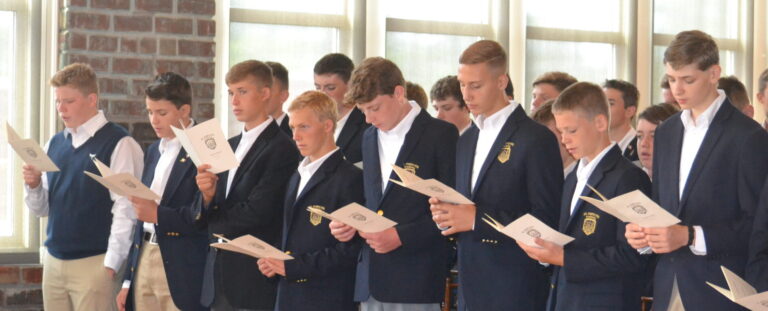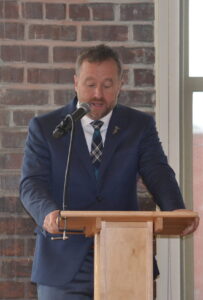
Opening remarks by Mr. Kerr
Ceremony of Investiture
September 4th, 2023

Thank you father and a very good morning and warm welcome to this assembly of faculty, of parents and students as we formally mark the opening of our Academic Year by this Ceremony of Investiture. This Investiture began informally in year one with the distribution of our class ties and has continued since, with the notable exception of last year when our Senior trip to France interrupted the tradition. We noticed that interruption rather strongly and I felt that something was missing at the beginning of last year, as if the year had not been properly begun. And while strict formality has never been quite our style here, yet it was clear that a formal ritual to mark the occasion of the boys’ entrance or return into this community, is important. My hope is that this year’s ceremony will define a new and appropriate standard of
solemnity for such occasion.
A month ago, I was asked to give a talk at the GK Chesterton Conference in the Twin Cities and for several days on the periphery of that talk, I spent several days visiting with a variety of interesting and intelligent people. One day at dinner, a fellow, well known and respected, asked me about St. Martin’s and specifically, whether we were a Classical school. Now, for a variety of reasons I’ve always been a little uneasy about that title in conjunction with St. Martin’s and so in an effort of honesty, I told him I didn’t know and then proceeded to flub about in an awkward existential crisis. I was frustrated at the time by my completely inadequate response and what was intended as a straightforward question. Upon returning home, I relayed this exchange and my frustration to Mr. Taylor who said he had recently had a very similar conversation. However, he had given a much better response. He said, no, ours is not a Classical education, it is rather a Medieval education. I quite agree with that. A good quote is worth repeating so for most, you’ll hear this again, from CS LEWIS speaking about medieval education and the medieval imagination:
Farriery, forestry, archery, hawking, sawing, ditching, thatching, brewing, baking, weaving, and practical astronomy. This concrete knowledge, mixed with their law, rhetoric, theology, and mythology, had an outlook very different from our own. High abstractions and rarefied artifices jostled the earthiest particulars…They talked more readily than we about large universals such as death, changes, fortune, friendship, or salvation; but also about pigs, loaves, boots, and boats. The mind darted more easily to and from between that mental heaven and earth; the cloud of middle generalizations hanging between the two was much smaller. Hence, as it
seems to us, both the naivete and the energy of their writing…They talk something like angels and something like sailors and stable boys, never like civil servants or writers of leading articles…
If you want to see a medieval man today, visit the Benedictine monks of Clear Creek Abbey in Oklahoma. The monks at Clear Creek are both closer to earth and closer to heaven and they appear to move effortlessly between the two.
This past year I read a book which poetically gets to the heart of a medieval formation better than anything else I have read. It is the first book in a trilogy about the life and legend of King Arthur titled The Once and Future King , written by T.H. White. You may not have heard of this trilogy but I would bet you have heard of the book I’m referring to because a rather charming Disney cartoon was made based on the book in 1963. It is The Sword in the Stone. The Sword in the Stone is about the education of Arthur or Wart, as he is known to his care-takers. Arthur’s formation under the wizard Merlin was decidedly medieval in the sense that C.S.
Lewis just mentioned. And it was incarnational in the most literal sense. Under the beneficent and magical tutelage of Merlin, Arthur is literally turned into a badger, a bird, a fish, and even a rock. He came to know and love these things and the world they inhabited from the inside out. This is the experiential mode of education if it has ever existed and this is what we strive for here as well – to inhabit our subjects, mentally, yes, but even physically however possible. To consider abstractly but also to feel in our bones the realities we are confronting. Now, to what end? What was Merlin preparing Arthur for? What was this education all about? Well, Merlin knew what Sir Ector and Sir Kay did not, that the orphan boy Arthur was destined to be King of all Merry England. And so Merlin’s education for Arthur was an education specifically in preparation for Kingship. Arthur would rule over the land and so Merlin wanted him to have an intimate understanding, a sympathy even, for everything that fell under his authority. And then there is the fact that Man himself is a microcosm of reality; he is part mineral, part vegetable, part animal and part angel. To know himself and govern himself, therefore, is to know and govern a lot. And that, as grand as it sounds, boys, is precisely what our education at St. Martin’s is aimed towards. Each of you is called to Kingship – to rule, to govern well those
people and things that God will ask you to govern: whether it be a family, a parish or something else. But prior to these things, and even more fundamentally, you must learn to govern yourself.
We don’t live in Arthur’s Britain, where heroic quests were custom made to order for knights and the supernatural operated out in the open. But make no mistake, we live in a world still enchanted by unseen forces that are at war. I have news for you boys – news which the world does not want you to know – very unsettling news. There is, at this very moment, a great battle taking place within you and the battleground is in your heart.
And so, indeed, the first and greatest battle is an internal one – it is the battle for self-control, self-governance, self-rule. You must learn to rule and take possession of yourself. Towards this end, the virtues you must especially seek to acquire in these formative years are Temperance and Courage. Temperance, to deny yourself the pleasure of easy, lesser goods and Courage, to stir yourself up to face the pain of pursuing the greater, more difficult goods.
This battle is not optional, you were thrust into it at your birth and baptism. And you must fight as if your very life depended on it because your very life depends on it. You either win, or lose and there are no ribbons for participation. The devil, Sicut leo rugiens circuit quaerens quem devoret, “like a roaring Lion seeking whom he would devour” – is not happy that you are here today and he would devour you, my boys.
So, just as St. Paul said in yesterday’s Epistle and Our Lord in the Gospel, you are going to take up arms to do battle against the enemy.
The good news is that you are not alone. On the human level, you have in the first place and always most importantly your families, who love you dearly and, although you are taking leave of them here today, who will be praying for you and encouraging you and sending you entirely too many packages from Amazon. You have us, the faculty, and our families, who have given our lives to your formation and will, at our best, love you as our own sons – so that in not so many years hence you can take your place with us and your parents in the fight. You have each other, your band of brothers, your fellow squires in training and future knights in combat. And then, of course, you have your guardian angels (who you should pray and talk to daily, if not
hourly, as a friend), — you have Saint Martin of Tours who was a boy your age once and will teach you when and why to draw your sword. You have our Lady and her Son, the High King (as the Irish monks used to call Him), under whose banner we will proudly march.
In just a moment you will stand up and you will declare what you stand for – which is everyone and everything I just mentioned – and you will do so under the sign of the Kingfishers. Kingfisher, in French, is Martin Pecheur which translates “St. Martin’s fisher”. You are each Saint Martin’s fishers and your life’s work is continually cast into the deep.
To commemorate this, for our new students, you will receive your class tie. A year from this day, at next year’s Investiture ceremony, you will receive in addition to your class tie, the all school tie, marking your passage to the next step in your formation. For our returning students, you will receive your class tie and, if you have already received your all-school tie, we will now consider that you have earned that tie. And for our Seniors, you will receive your class tie but also a Kingfisher pin to wear on your lapel, the same Kingfisher pin that the faculty wears. And, in the tradition of the Eagle Globe and Anchor of the Marine Corps, you are going to feel
the pin when it goes on. This is your invitation and your welcome to join me and the faculty this year as you come further up and further into the brotherhood of men.
This year will be a challenge and not simply for our new students. We cannot rest on any laurels and so all of us, the Senior faculty and teachers, House Fathers, Seniors and all students will be pushed to a higher standard of excellence in everything we do.
You have chosen and you have been chosen to undertake this adventure. I can speak from experience boys in saying that your lives will be changed. You are to be marked men. So, let these things, these ties and pins, be a reminder to you every day of that mark and your commitment here today. Cast into the deep as Saint Martin’s fishers, and let us all march with battle joy into the new year and beyond.

